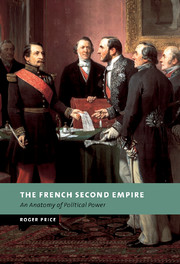Book contents
- Frontmatter
- Contents
- Acknowledgements
- List of abbreviations
- Introduction
- PART ONE THE RISE OF LOUIS-NAPOLEON BONAPARTE
- PART TWO STATE AND SOCIETY
- PART THREE THE RISE OF OPPOSITION
- 8 The context for opposition
- 9 The forms of opposition: (1) Legitimism
- 10 The forms of opposition: (2) Liberalism
- 11 The forms of opposition: (3) Republicans in the aftermath of the coup d'état
- 12 The forms of opposition: (4) The republican revival
- Conclusion to Part III
- PART FOUR WAR AND REVOLUTION
- General conclusion
- Select bibliography
- Index
12 - The forms of opposition: (4) The republican revival
Published online by Cambridge University Press: 14 August 2009
- Frontmatter
- Contents
- Acknowledgements
- List of abbreviations
- Introduction
- PART ONE THE RISE OF LOUIS-NAPOLEON BONAPARTE
- PART TWO STATE AND SOCIETY
- PART THREE THE RISE OF OPPOSITION
- 8 The context for opposition
- 9 The forms of opposition: (1) Legitimism
- 10 The forms of opposition: (2) Liberalism
- 11 The forms of opposition: (3) Republicans in the aftermath of the coup d'état
- 12 The forms of opposition: (4) The republican revival
- Conclusion to Part III
- PART FOUR WAR AND REVOLUTION
- General conclusion
- Select bibliography
- Index
Summary
INTRODUCTION
Republicanism continued to be represented not by a party in the modern sense, but by individuals with shared values, determined to resist repression, and to establish alternative institutions. During the 1860s, in a changing political and social context, at dates which varied between places, it became easier and safer to organise and propagandise. At the same time, the regime suffered from a spreading sense of malaise linked to renewed economic difficulties, foreign policy failures which tarnished its image, the evident physical decline of the Emperor, and the unsatisfied desire for greater political freedom. A feeling that the regime might not survive provided inspiration. Who were these republicans? There are no simple sociological definitions. Perceptions of interests and their translation into political allegiance are complex matters. Class is far from being the only source of identity. Republicans could be found in all social groups. Nevertheless, artisans and urban workers were far more likely to support the republican cause than were peasants, inspired by the prosperity which appeared to confirm the promise of the Bonapartist legend. However, in certain circumstances, workers and peasants might share a hostility towards those they believed were exploiting them – bankers, merchants, employers, and both urban and rural landlords, and such old enemies as ‘aristos’ and priests. Moreover, anxious about competitive pressures and determined to preserve their hard-won property and social status, many small businessmen – shopkeepers and workshop owners – were sympathetic and often offered leadership at local level.
- Type
- Chapter
- Information
- The French Second EmpireAn Anatomy of Political Power, pp. 344 - 394Publisher: Cambridge University PressPrint publication year: 2001



